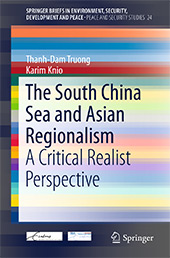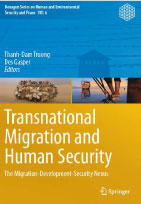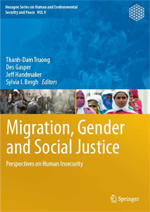|
|
| |
|
| |


SpringerBriefs in
Environment, Security, Development and Peace (ESDP)
A Peer-reviewed Book Series
Edited by
Hans Günter Brauch,
AFES-PRESS, chairman
Free University of Berlin (Ret.)
 |
Thanh-Dam Truong, Karim Knio: The South China Sea and Asian Regionalism - A Critical Realist Perspective. SpringerBriefs in Environment, Security, Development and Peace, vol. 24 (Cham – New York – Heidelberg – Dordrecht – London: Springer International Publishing, 2016).
ISBN (Print): 978-3-319-13550-2
ISBN (Online/ eBook): 978-3-319-13551-9
DOI: 10.1007/978-3-319- 13551-9
Order Form
Order this book on the Springer Website
Order electronic version and individual chapters |
| |
|
About this book
This book evinces the importance of placing research on the South China Sea in a Critical Realist framework, as well as using Archer’s morphogenetic methods of historical and sociological analysis to study the geopolitical transformations that have shaped contemporary conflicts in this maritime area. It demonstrates the necessity of carefully analysing the process of China’s contemporary maritime claims and sustained actions as the structural elaboration/reproduction of Asian maritime relations when China once, and periodically, ruled this open sea from the position of an imperial power. The book highlights the danger of ontological fallacy as expressed through various ideational corpora and interactions on maritime sovereignty, and discerns the areas of tension that can erupt into a full-scale conflict.
Future research on this sea area could benefit from a disentanglement of structure–agency interactions and the specific situational logics of the primary and corporate agents involved. The discourses on neo-liberalism and socialism with Chinese characteristics are to be considered as the mediator of a deeply-seated contention for a hegemonic position. Neither of them seems self-reflective enough to modify the dominant understandings of power and freedom for the sake of peaceful coexistence. ASEAN’s syncretic approach to upholding itself as a regional community built on the principle of ‘unity in diversity’ falls short of both a common position on security as defence and a common approach to transborder maritime security. A peaceful South China Sea requires careful consideration of the conditions that would produce a balance between different types of security—national or collective defence, maritime order for commerce and cooperation, and security of the marine ecology, together with their impact on human security as lived. Building forms of institutional cooperation with a peaceful motivation requires moving beyond the logic of trade-offs. More on this book is at:
Contents
1 Introduction
1.1 The South China Sea seen from the Perspective of Asian Regionalism
1.2 A Critical Realist Approach to Research on the South China Sea
2 Critical Realism and the Morphogenetic Approach
2.1 Clarifying the Meaning of Ontology
2.2 The Concept of ‘Emergence’ and the Implications of Living and Knowing in Open Systems
2.3 Linking Critical Realism to the Morphogenetic Approach
2.3.1 The Morphogenetic Approach in Succinct Terms
2.3.2 The Concept of ‘Interests’ in the Morphogenetic Approach
3 A Critical Genealogy of the Emergence of South China Sea as a ‘Complex’ in International Relations
3.1 The South China Sea as Hybrid Subject and Object
3.2 The South China Sea as Colonial Subject and Object
3.3 The South China Sea as Postcolonial Subject and Object
4 The United Nations Convention on the Law of the Sea (UNCLOS III) and China’s Assertion of the U-shaped Line
4.1 The U-shaped Line in China’s Maritime Claims and UNCLOS
4.2 Testing China’s Legal Claims: Resilience or Subordination
4.3 The ASEAN Way: Between Self-Reflective Understanding and Multilateral Diplomacy with Chinese Characteristics
5 Conclusion
On the Authors
On the Book
On the Authors
 |
Thanh-Dam Truong (Vietnam/The Netherlands) obtained her Doctorate of Philosophy at the University of Amsterdam. She is a retired Associate Professor of Women, Gender and Development Studies and coordinator of the research cluster on Migration and Human Security (2007–2012) in the International Institute of Social Studies (ISS) at Erasmus University Rotterdam, The Netherlands. Her long-standing research on Southeast Asia is multidisciplinary and addresses the nexus of culture and political economy. One of her foci is the nexus of gender, migration and human security. Her selected publications include: Vice, Virtue, Order, Health and Money; Towards a Comprehensive Perspective of Female Prostitution in Asia. (Bangkok: United Nations Economic Commission for Asia and the Pacific, 1985, 1986); Sex, Money and Morality: Prostitution and Tourism in Southeast Asia (London: Zed Books, 1990); Sex, Money and Morality: Prostitution and Tourism in South East Asia. (London: Zed Books, 1990); Japanese and Indonesian translations (1992); Poverty, Gender and Human Trafficking in Sub-Saharan Africa: Rethinking Best Practices in Migration Management. Paris: UNESCO, 2006); (with Wieringa, S.E.; Chhachhi, A.): Engendering Human Security: Feminist Perspectives (London - New Delhi: Zed Press - Women Unlimited, 2006); Transnational Migration and Human Security: The Migration–Development–Security Nexus, co-edited with Des Gasper (Berlin—Heidelberg—New York: Springer-Verlag, 2011); Migration, Gender and Social Justice—Perspectives on Human Insecurity, co-edited with Des Gasper, Jeff Handmaker and Sylvia I. Bergh, Hexagon Series on Human and Environmental Security and Peace, vol. 9 (Heidelberg—New York—Dordrecht—London: Springer, 2013.
|
Karim Knio (Lebanon/Netherlands) obtained his PhD at the University of Birmingham, UK. He is a Senior Lecturer in Politics at the Institute of Social Studies (ISS) at Erasmus University Rotterdam, and Associate Editor of European Political Science Review (EPSR). His research focuses on the political economy of governance with a focus on regionalism and trade. He also has interests in EU democracy promotion programmes, the politics of crisis management, Lebanese politics, institutional analysis and Varieties of Capitalism literature.
He is the author of The European Union’s Mediterranean Policy: Model or Muddle? A New Institutionalist Perspective, published by Palgrave Macmillan in 2013; (2013): “Structure, Agency and Hezbollah: A Morphogenetic View”, in: Third World Quarterly, 34,5: 856-872; (2010): “Investigating the Two Faces of Governance: the Case of the Euro- Mediterranean Development Bank”, in: Third World Quarterly, 31,1: 105-121; (2008): “Is Political Stability Sustainable in Post Cedar Revolution Lebanon?”, in: Mediterranean Politics, 13,3: 445-451; (2006): “Theorising the state of affairs in the Lebanese state: Is Lebanon a Failed State?”, in: Development ISSues, 8,2; (2014): “Structure, Agency and the Hizballah Dilemma in the Arab Spring”, in: Ezbidi, B.; Knudsen, A. (Eds.): Popular Protest in The New Middle East: Islamism and Post-Islamist Politics (London; New York: I.B.Tauris): 140-163; (2014): “Role of Experts and Financial Supervision in the EU: The de Larosière Commission”, in: Ambrus, M.; Arts, K.; Hey, E.; Raulus, H. (Eds.): The Role of ‘Experts’ in International and European Decision-Making Processes: Advisors, Decision Makers or Irrelevant Actors? (Cambridge, UK: Cambridge University Press): 341-360; (2013). “Investigating the Two Faces of Governance: the case of the Euro-Mediterranean Development Bank”, in: Hout, W. (Ed.), EU Strategies on Governance Reform: Between Development and State-building (London, New York: Routledge): 105-120; (2013): “Investigating the two faces of governance: the case of the Euro-Mediterranean Development Bank”, in: Hout, W. (Ed.): EU Strategies on Governance Reform: Between Development and State-Building (London: Routledge): 105-120; (with Sharma, A., 2011: “Financial Globalization and the Mechanisms of Migrants? Remittance: Formed by Supply or Demand?”, in: Truong, T.D.; Gasper, D. (Eds.): Transnational Migration and Human Security: the Migration-Development-Security Nexus (Berlin – Heidelberg: Springer): 103-116. |
 |
| |
|
Other books by these Authors
HEXA-
GON
Series
Vol 6 |
Thanh-Dam Truong, Des Gasper (Eds.): Transnational Migration and Human Security The Migration–Development–Security Nexus. Hexagon Series on Human and Environmental Security and Peace, vol. 6 ( Berlin – Heidelberg – New York: Springer-Verlag, 2011).
ISBN: 978-3-642-12756-4 (Print)
ISBN: 978-3-642-12757-1 (Online)
DOI 10.1007/978-3-642-12757-1_ (add chapter no.)
More on this book
Order this book on Springer Website
Electronic Version of book and individual chapters
Order form
Book Announcements and Book Reviews
Book Presentations and Press Conferences |

Electronic download data:
Since its online publication on
10 June 2011 until 30 November. 2015
this vol. has received
16,451 chapter
download requests.
|
| |
|
|
|

Electronic download data:
Since its online publication on
10 Sept. 2013 until 31 October. 2015
there have been a total of
40,166 chapter
download requests. |
HEXA-
GON
Series
Vol 9 |
Truong, Thanh-Dam; Gasper, Des; Handmaker, J., Bergh, S.I. (Eds.): Migration, Gender and Social Justice - Perspectives on Human Insecurity. Hexagon Series on Human and Environmental Security and Peace, vol. 9 (Heidelberg – New York – Dordrecht – London: Springer, 2013).
ISBN: 978-3-642-28011-5 (Print)
ISBN: 978-3-642-28012-2 (Online)
DOI: 10.1007/978-3-642-28012-2
More on this book
Order this book on Springer Website
Free download of the book and of individual chapters |
| |
|
|
|
|
|